I know. We shouldn't be complaining. We're out, in the middle of China, feasting on mutton head floating in cold intestine soup (actually, we're not; we've avoided that particular dish so far), while all of you are working. But, every once in a while, one hits a wall. This is that time.
Xi'an
Not particularly sure why, really. Xi'an was one of the most spectacular cities we've seen so far (granted, it was raining, so we weren't forced to contend with what is supposed to be an insane amount of pollution). It's a beautiful city, one of the few with its city walls still intact. You can walk around on top of them—it takes about four hours, which we didn't do given the aforementioned rain.
It has served as the capital of eleven Chinese dynasties, most importantly of the Qin dynasty, the first one that unified what we now know as China. The lone Qin emperor was also responsible for such minor advancements as the standardization of the Chinese writing system, the completion of the Great Wall, the standardization of weights and measures, and the construction of those infamous Terracotta Warriors (more on that later). Small stuff. Because of this, the town is steeped in culture.
It centers around the Bell Tower, which looks nothing like our western minds expect a bell tower to look. But, true to its name, it's fringed with bells. Just to its northwest is the Drum Tower (fringed with, well, drums). The emperor would ring the bells in the morning and beat the drums in the evening. And now, though not in use the way they used to be, the towers are dramatically lit at night and house an amazing museum of furniture and shadow puppets (yes, I just described a museum of shadow puppets as amazing. But when you think about the fact that these puppets are cut from translucent leather with an intricacy that belies the material they're made from, you'll agree. Of course, if we could show you pictures, that would be better, but certain censors persist in their dislike of Flickr).
To the north of the Drum Tower lies the city's Muslim quarter, home to the small Uighur population in Xi'an (there's a bigger one where we are now in Urumqi). Mostly a Chinese-run tourist trap at this point—myriad copies of Mao's little red book, in whatever language you want, as well fake watches, purses, "100% real cashmere" scarves, and the like—this quarter centers around a still-functioning mosque. Again, this looks nothing like you'd expect a mosque to look, but in the middle of the bustle of Xi'an, it's a haven of quiet, peace, and the occasional Russian tourist.
Despite its bustle, though, Xi'an has a very chill, laid-back vibe—at least, as chill as a city of 3.5 million people can be. (Of course, in China, that's a veritable hamlet, but no worries. The Greater Xi'an area boasts 11 million.) After the haranguing of Beijing, this was a haven.
The Terracotta Warriors, by the way, live up to their reputation, and are therefore justly thronged by people. They were also the only place where the touts—ubiquitous in Beijing—exsted in any number. Even in the bathroom: I followed a local Chinese guy into one of the public toilets. He waltzed in, made a left for the men's room, and did his business, unobstructed. I, on the other hand, was accosted with the most original pick-up line I've ever heard.
"Hallo! Sir! Money!"
That's it. No subtlety about it. The guy wanted to charge me the equivalent of $3 (US) for the privilege of using a urinal, just because of my big nose. And this wasn't even one of the three-star toilets you see around China (yes...as part of its preparations for the Beijing Olympics, China has even started giving its toilets stars.)
Not that you wanted to know about our lavatorial woes.
Trains
On the other hand, riding trains in China is, no question, an experience. We timed this portion of our trip to China poorly. October 1 is a national holiday, and the two weeks surrounding it see the heaviest travel of the year. This is China's Wednesday-before-Thanksgiving (the one in November, for you Canadians).
On any given, regular day, 1% of China's population is found on trains. This doesn't sound like much, until you think about the fact that that amounts to ten million people. And this number is likely doubled or tripled around the October 1 holiday. We found out.
I apologize for the stereotyping that's about to happen, but we can only write from experience, and this is what we've found: In one-on-one interactions, many of the people we've met (outside of the tourist industry) have been some of the most kind, hospitable, and helpful people we've met so far. But get these people into a group, pushing for entry through one small gate, onto a train with limited luggage space, and things change. Sharpen your elbows, because you're going nowhere otherwise (well, that's not exactly true. Boarding the 34-hour train from Xi'an to Urumqi, you didn't have to walk. You could have lifted your feet off the ground and been carried onto the train by the mass of humanity with one unified goal: make sure I get the prime spot in the train).
This is because, this time, it was we who were priced out of anything but worst-class. Open, cattle-car type trains, three bunks to a side, with only a small luggage rack with space for two backpacks and little else. It was an uncomfortable ride, but we were, quite likely, the only English speakers on the entire train, and definitely the only ones in our class.
And the attention we got! It was crazy. The train's provodnitsas (sorry...we're in China...fuwuyuanmen) would think nothing of sitting outside our berths and staring at us, blatantly. Our foreignness did, though, make for some great conversations. We met people willing to discuss Taiwan's politics at great length (and, simultaneously, attempt to pick Peggy up—he failed). We met students who wanted to teach us Uighur. We met Wang Yi and his girlfriend Mong Yen, two law students from Xi'an. Wang Yi has picked "Nick" as his English name because, he told us, "All the handsome actors in America are named Nick." And with his rock-star good looks, he chose wisely. Mong Yen—and her anime good looks—wanted us to pick her a name. We failed.
And we met the train's announcer. Every announcement on the train (and there were many; most of them smacked of propaganda—how to coexist on a train in harmony, what sort of food is appropriate to bring on a train, how to use the bathroom...that one needed instruction. Using a squat toilet on a train hurtling at 120 km/h takes some dexterity) was made in Chinese, English, and Uighur. The announcer must have heard that there were English speakers on the train, because, our second night, she came up to us and asked us to pronounce the announcements for her in English. She spent a good twenty minutes practicing (and, to her credit, improved amazingly).
Kindness, genuine interest, and a culture that thinks nothing of pushing old ladies aside to get a better spot on a train...it's contrast at its best.
Next stop
So, we're in Urumqi now, having arrived this morning. We'll be here, sampling Uighur food, until tomorrow, when we board yet another train for the thirty-six hour journey to Almaty. Currently we have no place to stay there. Evidently, some major exhibition has coincided with our Kazakh experience. Every hotel is booked. Wish us luck!
And maybe those are the walls. Maybe it's the trains and the lack of accommodation. Or maybe it's just that we've been on the road for a month. Oh, for a platter of sushi...
PS...once out of China, we'll post all the pictures.
30 September 2007
Hitting a wall...
Posted by
M
at
9/30/2007 08:21:00 AM
0
comments
![]()
Pleasanty surprise of groping!
The American embassy in Beijing is a walled fortress. To approach, you first wade through the throngs of Chinese people lining up to apply for an U. S. visa. You then meet with a guard who, after checking your American passport, lets you through a turnstile, where you shortly encounter a second guard who goes through your documents again, and you find yourself in a magnetically locked room where your belongings are scanned (and water, sharp objects, and cameras confiscated), after which you walk through a metal detector. After emerging from this you are greeted by a Starbucks, and then a US marine who again checks your ID one last time before you are let into a little room for services to American citizens.
I would have liked to make fun of this attempt at isolation, but honestly it was the first time I could hear myself think since we arrived in China. It was a bit of a relief. Being in China is like standing in Times Square on New Year's Eve, only worse if you look the least bit foreign. Touts shouting "Hallo sir, come come!" while thrusting their wares in your face (kites, electric tops that lit up like a disco ball when you spun them, socks). In buses, loud karaoke music blares, with different music depending on if you are to the right or the left of the aisle. And then there is the almost orgasmic satisfaction the older folks take in announcing their bodily functions, whether it be coughing, spitting, or performing that farmer's blow. In preparation for the 2008 Olypics in Beijing there is an honest attempt to clean up and gentrify, but it is only a thin veneer that is easily scratched away. Witness: The Forbidden City has been garishly touched up, with some buildings patched and painted so that the roofs appear brand new, yet the interiors are in horrific condition, with the smell of dirty underwear emanating from the main throne room. Or the railway, with steel tracks perched on concrete blocks, yet an antiquated system of boarding the train that involves lining up 1 hour early in order to punch, scratch, and kick your way past a ticket checker so that you can get onto the platform. We sorely miss Western efficiency where "no problem" really means things will be done, like buying a train ticket or posting a package. Instead, we have slowly become obsessive compulsive as we double then triple check the money we get from a money changer, tickets that we buy from a travel agent, and room reservations. It is hard to adjust to living with a sense of vagueness, with not knowing whether or not things that we would have taken for granted back home would actually happen here. Everything is fluid, whether it be prices, promises, or schedules. It is with this and the constant assault on the senses that we have experienced the most culture shock, and made us miss the good old U.S. of A.
And the Chinglish. Oh, the Chinglish. "Slipy Carefully" behind the toilet in our bathroom. "Please for attention. Be careful don't dropet" in a touristy spot. And then our favorite. At the big 3.3 mall in the Sanlitun area in Beijing, underneath a picture of a model dressed to the nines, was the phrase, "Pleasanty surprise of groping."
Posted by
Peggy
at
9/30/2007 08:19:00 AM
0
comments
![]()
Labels: China
26 September 2007
Out of the steppes
Alright...I give up. I delayed publishing this post because I sorely wanted it to be accompanied by pictures. But, the fact is, not only have we taken—between us—about 1200 pictures (I'm not making that up. Don't worry...we won't subject you to all of them. Unless you're our parents. Then, prepare yourselves...), but we've spent many a frustrating hour with internet connectivity in China. Certain websites are suspiciously always "temporarily unavailable." The BBC is one of them; Wikipedia suffers the same fate. Unfortunately, Flickr, where our pictures are hosted, seems to be subject to these vagaries and is therefore causing us myriad problems.
Of course, it could also be the slow computers and twitchy internet access we have in our backwater hostel in one of Beijing's hutongs. Literally outside our window, currently, is one of those drunken parties that flirts with (but so far hasn't descended into) violence.
But enough grousing. We made it out of the steppes in one piece, and, as I said, thoroughly, madly, unabashedly in love with a new country.
Since our last post, we've spent 144 hours on trains and buses, covering 7,972 kilometers. We've met people crazier than us (eg: Bish and John, bicycling around the world in two years, and documenting their beard growth as they do it), made friends with a veterinarian who splits her time between Irkutsk and Ulaan Baatar, where she works as a quality control coordinator for a rendering plant, assuring that the kolbasa imported into Russia is of good Russian quality, learned a plethora of new games (including one that's played with the remnant ankle bones of a slaughtered goat...more on that later), eaten fathomless amounts of Nutella, sausage, and ramen (but not all together...usually), and sampled more than a few Russian vodkas (thanks, mostly, to Andrew and Kim, another set of hard-core backpackers from the UK).
The Trans-Siberian has changed significantly in the last nine years. In 1998, there were four tourists on the entire train. In 2007, there were four whole carriages of tourists. Sadly, many of the Russians, Mongolians, and Chinese traders who formed the backbone of the rail line's customer base have been priced out of anything but worst-class. This leaves the train and its dour provodnitsas at the mercy of drunken Westerners. No wonder they try to charge for hot water.
The railway itself is a massive feat of Soviet (and now Russian) engineering. As proof, there is a marker every hundred meters. Along its entire length. As of 2002, the whole of the Russian portion of the line (Moscow to Vladivostok) has been electrified, making for faster and more energy-efficient trains. The rails in China have also been changed to concrete, minimizing the railway's deforesting impact. And Mongolia...well, they have a bit to go.
But! Mongolia is an ineffably amazing country. Really, drop your plans for Tofino and head out to Mongolia next chance you get. I can't speak highly enough about that country, its people, or the experiences we had in our seven days there. It's impossible to describe Mongolia without descending into cliche, so here goes.
Some highlights of the last couple of weeks:
1. Horseback riding on the Mongolian steppes. (Behold! Cliches!) There is absolutely nothing like riding on the back of a powerful, galloping animal across wide-open, wind-swept steppes with nothing but mountain, grass, and the occasional ger anywhere in your sight. This wasn't your typical tourist-rides-a-horse thing (where the horses walk, bored, nose to derriere). No...these horses gallop. And fast. Fast enough that the grasshoppers accidentally divebomb your face in an attempt to get out of the way.
The thing about Mongolia is that, by dint of the fact that life in the desert and steppes isn't easy, everything is communal. As we approached our camp at the end of our day of riding, a flock of someone else's sheep had found its way there too. So, atop these galloping horses, we herded them back to where they were supposed to be. It wasn't like a movie. It may as well have been one.
2. Gers. Yes, it was seven degrees below zero at night in the desert. And yes, we were sleeping in circular, felt-lined tents, getting up every two hours to try (unsuccessfully) to keep the fire going. But, honestly, the gers are much more comfortable than most hostels we've stayed in. And provided you don't move, you stay pretty warm. Until 3:00 am. Then it's just a fight till the sun comes up. And this, they kept reminding us, was just the start of fall.
3. Mongolian. The language. What a strange one that one is. Masculine and feminine vowels? (really...who gives their vowels genders? And consonants change the way they're pronounced depending on the gender of the vowel before which they sit; but, to confuse you more, the vowels themselves don't necessarily always sound different).
Or, an aspirated L? (every L sounds like it's preceded by a very soft T, with air escaping out of the sides of your tongue. So, it's Utlaan Baatar).
And then there are the four vowels that span the spectrum between O an U. I still couldn't hear the difference, despite pestering many a Mongolian.
4. Food. This includes fermented mare's milk, and more mutton than you can imagine, but it's amazingly good. We happened to be at the ger of a nomad family when it came time for them to milk their mares (not hard to time that one; they do it every two hours) and kill a goat. That was a gruesome sight—two blows with a hammer through its skull stunned it, after which the guy killing it stuck his hand into its chest and, somehow, did the deed. It took two hours, start to finish, to kill, skin, disembowel, wash, and cook the goat. I'd show pictures, but...
5. Hospitality. There wasn't a single time we walked into a ger that we weren't offered something to eat or drink. This did mean medium-rare goat liver wrapped in omentum and grilled on the open fire after its owner was slaughtered, but nothing that we needed ever went unmet. This also meant playing the ankle-bone game with someone you'd never met before, sharing only a few words in common, and bonding over a bar of dark Russian chocolate.
6. Lake Baikal. Yes, it's not in Mongolia, but in the world's largest fresh-water lake, the water is drinkable without adverse side-effects (at least, none so far). And it's bitingly cold. That doesn't stop the Siberians—or us two crazy Americans—from jumping in it.
I could go on, but with that, I've probably already rambled too much. We're off to Xi'an in three hours. We'll post the pictures as soon as we can get them up.
Posted by
M
at
9/26/2007 06:20:00 AM
0
comments
![]()
24 September 2007
The election results
So, at some point in the last two weeks that we've been gone, the votes were finally counted in Sierra Leone. The opposition candidate, Ernest Bai Koroma, won pretty handily. Despite a complete shift in power in both the executive and legislative branches of this nascent democracy fresh out of civil war, though, there was very little violence. Not only that, but this country is being held up as a model of democracy in Africa. Is it wrong to be proud of that?
And yes...we're out of the steppes. We've got a whole, long, voluble post written, but we're having a bear of a time getting our pictures uploaded. So, I'll hold off on posting it for another couple of days in possibly vain hopes.
But we're back to civilization in one piece and thoroughly, madly in love with a new country. Iceland, you may have met your match...
More later. Thanks for all your e-mails while we were away!
Posted by
M
at
9/24/2007 10:10:00 AM
0
comments
![]()
Labels: elections
09 September 2007
Нью-Йорк
This will be our last post for a while, likely...
In seven hours, we'll be boarding the Trans-Siberian, on our way to our first stop at Lake Baikal, in Siberia. Between us and this first stop lie 5189 km and 84 hours of uninterrupted train tracks. From there, we'll make a right-hand turn and cross the Russian-Mongolian border to Ulaan-Baatar, where we'll alight for a couple of days. That's followed by three days in the Gobi Desert around Sainshand, near the Mongolian-Chinese border, and then a relatively quick jaunt from Sainshand into Beijing, hopefully arriving by mid-afternoon on the 23rd of September. Fourteen days from today.
So, despite a lack of pictures of Moscow to share with you (mainly because it's been raining cats and dogs since we got here, making us ill-disposed toward doing anything besides finding random street vendors and buying rotisseried chicken for $2), a bit about this city:
(If travel writing is about generalizations, this post will be its quintessence.)
I know Peggy has mentioned its warmth in her last post. It's true, and it's surprising, given the hard-edged, Mafia-run reputation this city has (or, maybe that's just me). But really, it reminds us of New York. Except in Cyrillic.
Whereas St. Petersburg was beautiful, and filled with beautiful people, and in-your-face fashion (though someone's got to tell them that high-waisted jeans and the hose-and-open-toed-shoes look both need to go), Moscow's fashion is much more understated, but no less real. In St. Petersburg, our smiles were brightened by the single person who was actually kind to us in three days there (a babushka who collected our tickets on a random city bus, found us—and our large backpacks—a seat, and signalled us before our upcoming stop), people here in Moscow are brusque but amazingly helpful.
Ask a New Yorker directions, and they'll pride themselves in knowing their way around the confusing mass that is Manhattan. The same seems to be true here. People have gone out of their way to help us. So, yes...not as many leggy, platinum blondes, but give me NYC over LA any day.
And then there's the subways. They're just like home—old, dirty, crowded, un-airconditioned, and full of people trying very hard to look at nothing (what's not to like?). It's actually allayed a bit of our homesickness. The system itself...well, the MTA could learn a thing or two. It's definitely big and overwhelming, and supposedly carries seven million people. A day. But it's well-signed and, more importantly, reliable. We have yet to wait more than three minutes for a train. Even early on a Sunday morning. There's a clock that resets itself when the last train leaves and times the wait between trains. This is not to mention the escalators, which are dizzyingly fast and long. The Roosevelt Island station has nothing on the depth underground that this subway system inhabits.
We started today with a Russian Orthodox church service, at the Cathedral of Christ the Savior (we can't take credit for that picture), which has likely the best interiors we've seen yet. Too bad photographs weren't allowed during the service. The differences between Mass there and church at home are huge. Viz:
1. There are no chairs. Everyone stands. And crosses themselves and bows, quite literally, once every thirty seconds.
2. The usual liturgical interchange between the celebrant and the congregation doesn't exist. It's replaced by an interchange between the celebrant and a (beautiful) choir. In fact, besides the incessant crossing, the congregation only spoke up at the creed and one other time which we couldn't quite figure out.
3. Everything is sung. I mean, everything. Now, I know that exists in a lot of high-church services, but it was pretty impressive.
4. There is a very palpable sense of transcendence that we in Western traditions seem to have lost. The fact that the most holy portions of the service occurred within the iconostasis, with its doors closed, highlighted this. Yes, it strikes my egalitarian, reform-theology Weltanschauung as a bit exclusionary, and pushes the divine away from humanity, but, I tell you, the first time the doors of the iconostasis closed, my psychic gut was punched. In a good way.
This is neither the time nor the place to descend into transcendence vs. imminence theological ramblings (nor will the 9 minutes left on my internet cafe subscription allow it), but it struck me that despite the strict, almost incomprehensible liturgy of this service (which I've been inculcated to revolt against), it moved more than a few people around us to tears, and a bigger number to their knees. On hard marble floors. There's something to be said for that.
And with that, we leave the New York of Russia... We'll see you on the other side of Asia.
Posted by
M
at
9/09/2007 08:37:00 AM
1 comments
![]()
Labels: Moscow
08 September 2007
French fries but no ketchup...
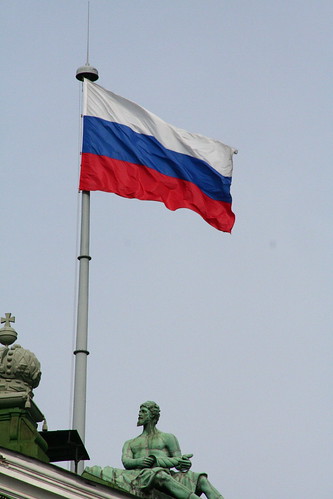 We finally feel like we are in a foreign country.
We finally feel like we are in a foreign country.
We have been spoiled travelling in Iceland and Finland, where everyone spoke English and you could (sometimes) read the signs. Russia is a little different. The writing is all in Cyrillic, which means that unless you recognize the letters you can't spell out a thing. Even the most touristy areas are manned by people who do not speak much English. This has led to much gesticulating on our part and some rather humorous misunderstandings. Truthfully, it's been more than a little stressful because during medical training, we are misled to believe that we can accomplish tasks successfully on the very first try. Yet yesterday we spent over and hour going to 5 different banks trying to withdraw money with our ATM card. We were mostly unsuccessful. It felt like, well, rejection.
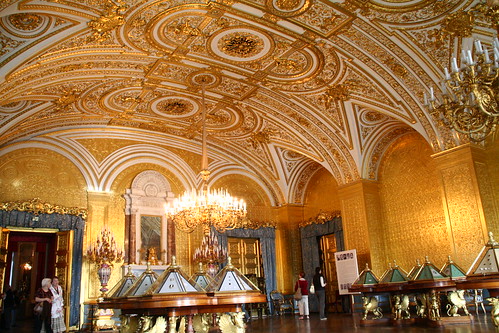 closing time. Mark found his favorite room in the Winter Palace, a room completely gilded with gold leaf, from the walls and ceiling to the chandeliers and clocks. Peggy spent a lot of time staring at the 2 Madonna and Child paintings by Leonardo da Vinci.
closing time. Mark found his favorite room in the Winter Palace, a room completely gilded with gold leaf, from the walls and ceiling to the chandeliers and clocks. Peggy spent a lot of time staring at the 2 Madonna and Child paintings by Leonardo da Vinci. From St. Petersburg we started the first leg of our Trans-Siberian trip to arrive in Moscow. While St. Petersberg was splendid but brusque, Moscow seems downright warm. The people we have accosted for directions on the street have all had a smile and the patience to spend time explaining things to us. We were pleasantly surprised; Moscow, at least as we had seen it through the eyes of Western media, has always seemed a bit dangerous and wild.
Mark has a tradition whereby whenever he visits Moscow, he goes to the first McDonald's to open in a communist country. It was packed, and the menu was full of familiar favorites such as big macs and flurries. However, for the life of us we could not find anyone with a ketchup packet. I guess fries are best eaten plain in Russia. (Our Moscow pictures are not yet uploaded. We'll try to post them soon)
The World Press Photo Exhibit is currently being exhibited in St. Petersburg at the Peter and Paul Fortress. Click here to look at some pictures by Spanish photographer Pep Bonet on members of the Single Leg Amputee Sports Club in Sierra Leone.
We board a train tomorrow night for Irkutsk, Lake Baikal, Ulaan Baatar, the Gobi Desert, and finally Beijing. We may be out of e-mail contact for a while. Wish us luck!
Posted by
Peggy
at
9/08/2007 09:01:00 AM
0
comments
![]()
Labels: Moscow, St. Petersburg, war crimes
07 September 2007
Just like Korean...
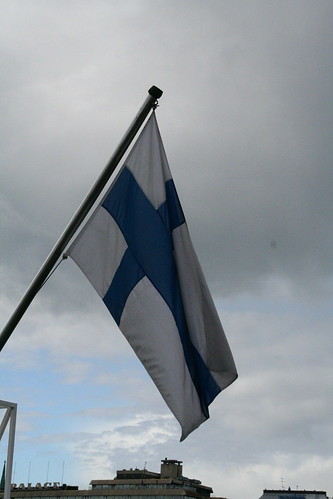 It's hard, honestly, not to feel a bit of a let-down going from the rugged, unsurpassed beauty of a country like Iceland to the man-made beauty of the northern European capitals. From lava, sulfur, and steam, we've transitioned to manicured streets, H&M, and the ubiquitous sushi bar. Or суши-бар. But I'll leave Peggy to write more about Russia.
It's hard, honestly, not to feel a bit of a let-down going from the rugged, unsurpassed beauty of a country like Iceland to the man-made beauty of the northern European capitals. From lava, sulfur, and steam, we've transitioned to manicured streets, H&M, and the ubiquitous sushi bar. Or суши-бар. But I'll leave Peggy to write more about Russia.
On to Helsinki. An extraordinarily turbulent Icelandair flight landed us in Europe's second-northern-most capital (I didn't make that up. They pride themselvs in that). Helsinki is, objectively, a very pretty city. Because the country has changed hands many times—the indigenous Sami people were conqured by Vikings, who were then subjected to Swede rule in 1155, after which the country was ceded to the Russians in 1809, who held it until Finnish independence was declared in 1917 (follow?)—there is a slightly disjointed nature to the city, as if each part of its history is vying for prominence. Viz: the Uspensky cathedral was the tallest building in Helsinki until 1852, when t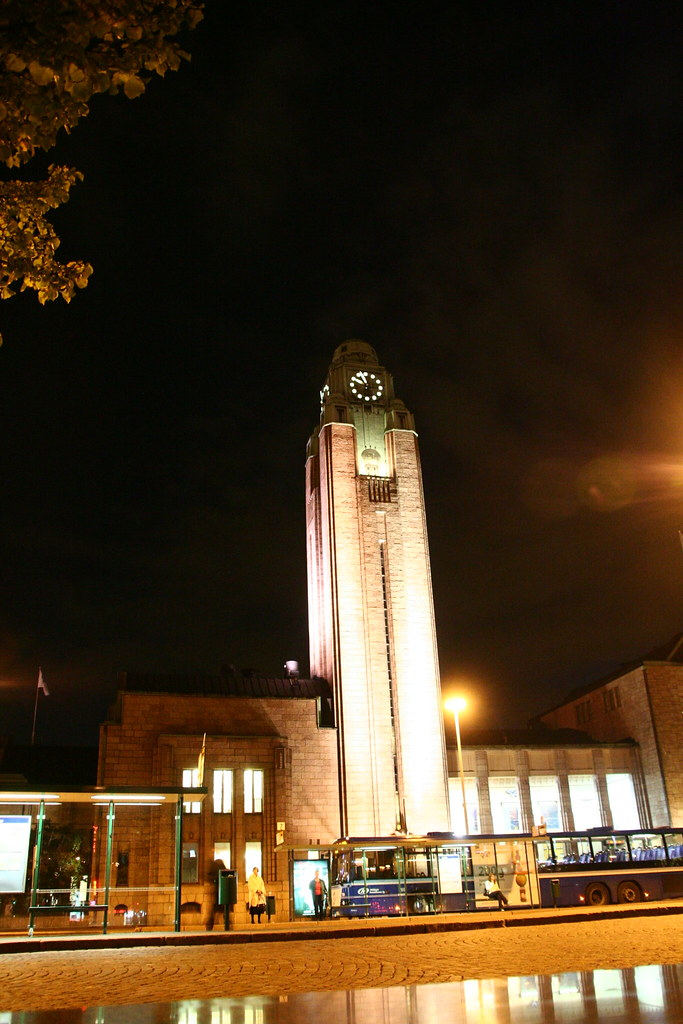 he Lutheran cathedral, the Tuomiokirkko, was built.
he Lutheran cathedral, the Tuomiokirkko, was built.
And that brings up another point about Helsinki...we had a bear of a time trying to pronounce anything. The language is a member of the Uralic family of languages, to which Hungarian and (controversially, of course) Korean also belong. Explain that one. It has fifteen cases, multiple doubled letters and very few cognates with English. This is because it's not of Indo-European descent, making trying to figure out what signs meant pretty difficult.
No problem. To help us along, all signs were bilingual...in Swedish.* It took us a while to figure out that Helsinki and Helsingfors were the same thing.
We left Helsinki on the 5th by train for St. Petersburg. More on that later. Meanwhile, some pictures...
Posted by
M
at
9/07/2007 10:08:00 AM
0
comments
![]()
Labels: Helsinki
04 September 2007
Troubles in Sierra Leone
As proof that we really are going to Sierra Leone and not just traipsing around the world to while away a year...
The much-anticipated run-off election for the Presidency of Sierra Leone is coming up at the end of this week. Unlike with the first round, which was a stunning success, campaigning this time around has been fraught with difficulty. Twenty people, for example, were hurt in a recent clash.
The two presidential candidates (Ernest Koroma, who took 44% of the vote the first time around, and current vice president Solomon Berewa, who took 38%) are urging their supporters not to resort to violence and have themselves promised the current president not to "use militia"...one wonders what that means. Or whether those promises are true. Meanwhile, President Kabbah has threatened declaring a "state of emergency."
Hard to know what to think of all this...
Posted by
M
at
9/04/2007 12:43:00 PM
0
comments
![]()
02 September 2007
The foggy bay
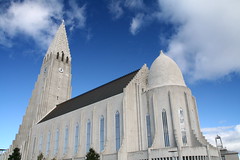 In 101 Reykjavik, Hallgrímur Helgason describes a city, and a generation, of idleness, depression, self-destruction, and wanton boredom. His main character, Hlynur, calls Iceland "a wind-beaten a**hole and Icelanders the lice on its edge." The entire story is one of interrupted, failed catharsis (and, despite the negative reviews on Amazon, it´s a fascinating book).
In 101 Reykjavik, Hallgrímur Helgason describes a city, and a generation, of idleness, depression, self-destruction, and wanton boredom. His main character, Hlynur, calls Iceland "a wind-beaten a**hole and Icelanders the lice on its edge." The entire story is one of interrupted, failed catharsis (and, despite the negative reviews on Amazon, it´s a fascinating book).
The fact is, I hate to say it, but as beautiful as Reykjavik can be in the sunshine, it exudes the same. The entire town (well, the entire town of our generation) takes gluttonous part in a tradition benignly called runtur. The "round tour" is an all-night pub-crawl that starts in the early evening on Friday night and continues, in some form or other, until the early morning on Monday.
Not that there's anything wrong with drinking, pub crawls, and all that. But there's a sense of desperation about some of this drinking. A sense of doing it because, honestly, there's nothing else to do.
I hate the fact that this post is coming across so, well, supercilious. We've been wracking our brains for a way to describe Reykjavik. So, I'll leave this train of thought. We have met some tremendous people here, including the owner of our current guesthouse. And the food is unsurpassed. Even if you pay $20 for a regular, run-of-the-mill salad.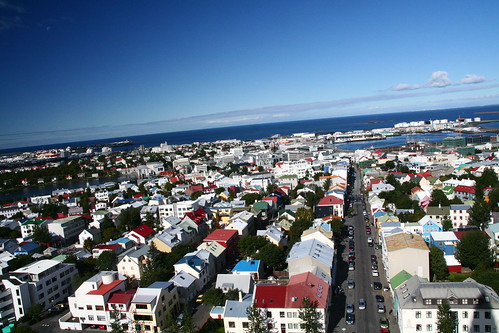
And in the sunshine, Reykjavik is beautiful. Its dominant church, the Hallgrímskirkja, is gorgeous. Plus, attending an Icelandic church service was amazing. The church sits on a hill. From the pews, you see no ground, only clouds, as if you're in the air.
Tonight's our last night in this amazing (and amazingly contrasted) country. We fly out tomorrow for Helsinki.
Posted by
M
at
9/02/2007 02:26:00 PM
0
comments
![]()
Labels: Iceland
01 September 2007
Fire and Ice
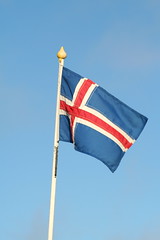 We´ve done it! Trekked on slippery cliffs overlooking the sea in Snæfellsnes, forded rivers on the F586 shortcut in our trusty Jeep (whom Peggy nicknamed Þór), peered into smoking fissures around Grjotagja in the Lake Myvatn area, almost touched Europe´s biggest waterfall (Dettifoss), and boated among glaciers in Jokulsarlon. Along the way Ryan, Mark´s brother, has chased after multiple sheep in an attempt to get a picture with them, Peggy has become obsessed with Skyr, a curdled milk concoction that tastes like creamy yogurt, and Mark has become an expert in off-road driving. Our Icelandic has improved marginally (Takk fyrir!), we´ve discovered that staying in a friend of a friend of a friend´s apartment/guesthouse found through word of mouth is the best way to go, and we´ve cheered on the impressive reforestation efforts of the country. In four days, we circled the entire island, covering 1700 km.
We´ve done it! Trekked on slippery cliffs overlooking the sea in Snæfellsnes, forded rivers on the F586 shortcut in our trusty Jeep (whom Peggy nicknamed Þór), peered into smoking fissures around Grjotagja in the Lake Myvatn area, almost touched Europe´s biggest waterfall (Dettifoss), and boated among glaciers in Jokulsarlon. Along the way Ryan, Mark´s brother, has chased after multiple sheep in an attempt to get a picture with them, Peggy has become obsessed with Skyr, a curdled milk concoction that tastes like creamy yogurt, and Mark has become an expert in off-road driving. Our Icelandic has improved marginally (Takk fyrir!), we´ve discovered that staying in a friend of a friend of a friend´s apartment/guesthouse found through word of mouth is the best way to go, and we´ve cheered on the impressive reforestation efforts of the country. In four days, we circled the entire island, covering 1700 km.
Iceland sits on the mid-Atlantic ridge, with the national park Þingvellir perched on the rift between the North American and European plates. It´s a country of contradictions, with massive glaciers down south (witness Vatnajokull, which covers 8400 sq km) and boiling mud pits up north near Krafla. It´s a geologically active country, with frequent natural disasters caused by the past eruptions of volcanoes Hekla, Laki, Katla. Perhaps because of this, the Icelandic people seem to be so unflappable. They are able to zoom through gravel roads with 17% inclines in the fog and rain without blinking an eye, and view the sudden transition from sunny day to chilling gray downpours with a matter-of-fact attitude. There seems to be a sense of connectedness with the land that we haven´t seen before. 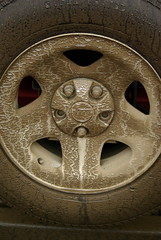
We´ve been lucky enough to meet some very nice Icelanders, including a guesthouse owner in Egilsstaðir who invited us in for a cup of tea. We were bedraggled and hungry, having been turned away from 3 hotels already, and so he spent an hour calling hotels in the vicinity. Everything was full because a ferry for Denmark was departing the next day, so he offered to let us weary and heavy-laden tourists sleep in the little church he had set up in an upper room of his guesthouse. The next day, on his recommendation, we stopped in Kirkjubæjarklaustur (located, honestly, about midway between Höfn and Hella) for the best pizza in Iceland.
Click on the pictures to get to the album. We haven´t spent much time in Reykjavík yet, so pictures of the capital (a marginally depressing town, really), we´ll add later.
Posted by
Peggy
at
9/01/2007 09:19:00 AM
1 comments
![]()
Labels: Iceland




